高考英语核心词汇700讲与练 Day 12
考点12 动词ing (核心考点精讲精练)-备战2025年高考英语一轮复习考点帮(新高考通用)
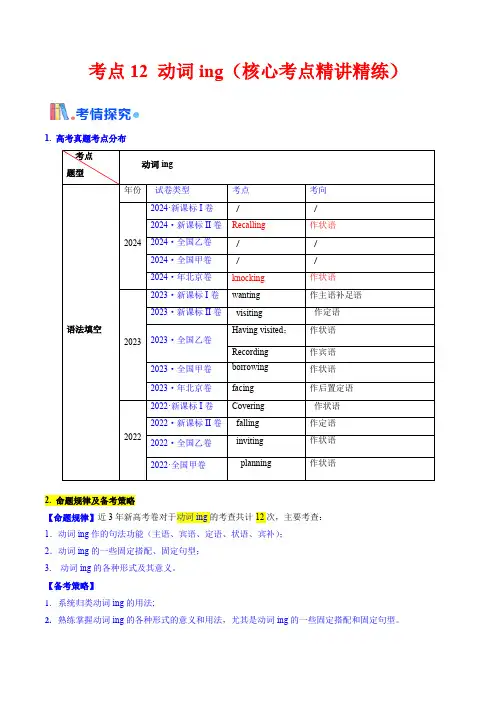
考点12 动词ing(核心考点精讲精练)1. 高考真题考点分布考点题型动词ing语法填空年份试卷类型考点考向20242024·新课标I卷//2024·新课标II卷Recalling作状语2024·全国乙卷//2024·全国甲卷//2024·年北京卷knocking作状语20232023·新课标I卷wanting 作主语补足语2023·新课标II卷visiting作定语2023·全国乙卷Having visited;作状语Recording 作宾语2023·全国甲卷borrowing 作状语2023·年北京卷facing 作后置定语20222022·新课标I卷Covering作状语2022·新课标II卷falling 作定语2022·全国乙卷inviting 作状语2022·全国甲卷planning 作状语2. 命题规律及备考策略【命题规律】近3年新高考卷对于动词ing的考查共计12次,主要考查:1.动词ing作的句法功能(主语、宾语、定语、状语、宾补);2.动词ing的一些固定搭配、固定句型;3. 动词ing的各种形式及其意义。
【备考策略】1.系统归类动词ing的用法;2.熟练掌握动词ing的各种形式的意义和用法,尤其是动词ing的一些固定搭配和固定句型。
【命题预测】预测2025年高考语法填空和短文改错对动词ing考查仍然会成为的热点、重点和难点,尤其是考查动词ing一些固定搭配和固定句型;V-ing与V-ed的辨析仍然是考查重点。
必备基础知识:1)非谓语动词是具有动词的特征,因此它有时态的变化、语态的变化,各种形式具有自己的意义。
动词ing的各种形式非谓语动词主动语态被动语态意义现在分词/动名词一般式doing being done其表示的动作与句中谓语动词的动作同时发生,或几乎上同时发生完成式having done having been done其表示的动作先于句中谓语动词的动作发生2)非谓语动词的句法功能:功能形式主语宾语表语定语状语补语不定式√√√√√√V-ing√√√√√√V-ed√√√√3)动词ing的基本意义现在分词的一般式表示动作与谓语动词的动作同时发生;现在分词的完成式表示动作发生在谓语动词的动作之前;Walking down the street, he hears someone calling him.在街上走着,他听到有人叫他。
高考英语核心词汇讲和练 (13)
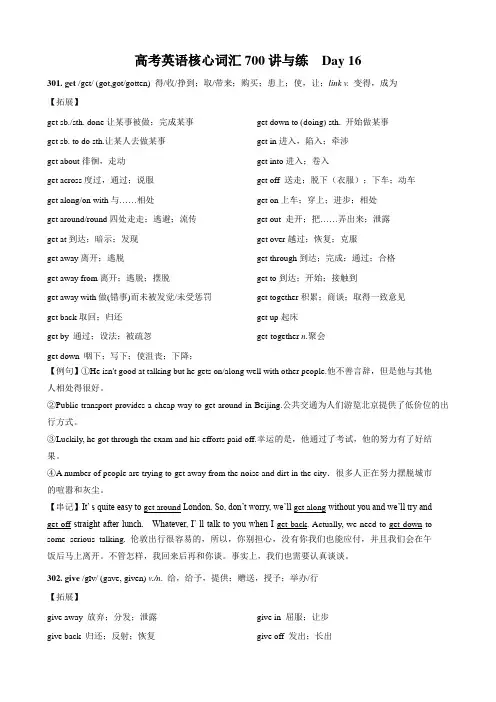
高考英语核心词汇700讲与练Day 16301. get /get/(got,got/gotten) 得/收/挣到;取/带来;购买;患上;使,让;link v.变得,成为【拓展】get sb./sth. done让某事被做;完成某事get sb. to do sth.让某人去做某事get about徘徊,走动get across度过,通过;说服get along/on with与……相处get around/round四处走走;逃避;流传get at到达;暗示;发现get away离开;逃脱get away from离开;逃脱;摆脱get away with做(错事)而未被发觉/未受惩罚get back取回;归还get by 通过;设法;被疏忽get down 咽下;写下;使沮丧;下降;get down to (doing) sth. 开始做某事get in进入,陷入;牵涉get into进入;卷入get off 送走;脱下(衣服);下车;动车get on上车;穿上;进步;相处get out 走开;把……弄出来;泄露get over越过;恢复;克服get through到达;完成;通过;合格get to到达;开始;接触到get together积累;商谈;取得一致意见get up起床get-together n.聚会【例句】①He isn't good at talking but he gets on/along well with other people.他不善言辞,但是他与其他人相处得很好。
②Public transport provides a cheap way to get around in Beijing.公共交通为人们游览北京提供了低价位的出行方式。
③Luckily, he got through the exam and his efforts paid off.幸运的是,他通过了考试,他的努力有了好结果。
高考核心词汇1200个早读、课前讲解乱序扫盲课件-2024届高三英语二轮复习

181 rank
n. 排名,等级
196 distance
182 total
n. 总数
197 ordinary
183 contain
v. 包含
198 movement
184 department n. 部门
199 involve
185 native
adj. 当地的 n. 当地人 200 jam
186 expression n. 表达,表情,短语 201 frequent
126 goods
n. 商品
127 process
n. 过程
128 willing
adj. 愿意的
129 thus
adv. 因此
130 fortunate adj. 幸运的
131 damage
n. / v. 损坏
132 direct
v. 引导,指向
133 remind
v. 提醒,使回忆
134 organization n. 组织
adj. 合适的
256
n. 斑点,污点,地点 257
v.发现
n. 失败
258
adj.渴望的
259
n. 家伙
260
adj. 经典的
261
n./ v. 奖赏,报偿
262
v. 宣布
263
n. 功能
264
n. 助手
265
n. 听力
266
v. 探索
267
n. 和平,安静
268
n. 善举
269
n. 泥土
270
escape replace besides crop confidence attempt potential custom shock respond soil construct
2021届高考英语基础核心词汇讲与练(全)
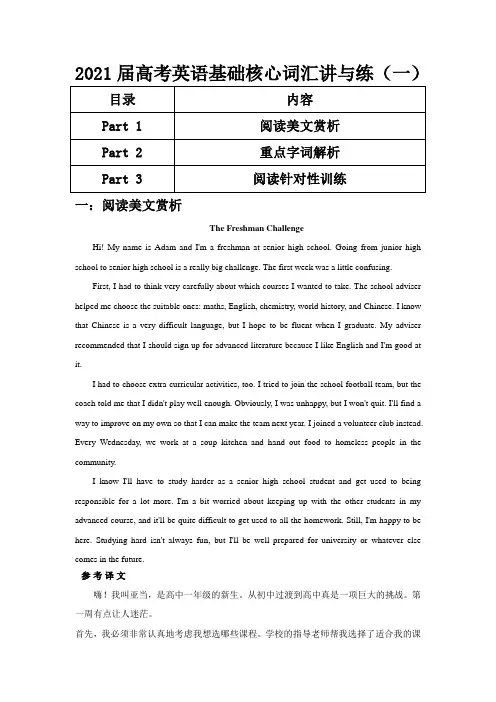
2021届高考英语基础核心词汇讲与练(一)一:阅读美文赏析The Freshman ChallengeHi! My name is Adam and I'm a freshman at senior high school. Going from junior high school to senior high school is a really big challenge. The first week was a little confusing.First, I had to think very carefully about which courses I wanted to take. The school adviser helped me choose the suitable ones: maths, English, chemistry, world history, and Chinese. I know that Chinese is a very difficult language, but I hope to be fluent when I graduate. My adviser recommended that I should sign up for advanced literature because I like English and I'm good at it.I had to choose extra-curricular activities, too. I tried to join the school football team, but the coach told me that I didn't play well enough. Obviously, I was unhappy, but I won't quit. I'll find a way to improve on my own so that I can make the team next year. I joined a volunteer club instead. Every Wednesday, we work at a soup kitchen and hand out food to homeless people in the community.I know I'll have to study harder as a senior high school student and get used to being responsible for a lot more. I'm a bit worried about keeping up with the other students in my advanced course, and it'll be quite difficult to get used to all the homework. Still, I'm happy to be here. Studying hard isn't always fun, but I'll be well prepared for university or whatever else comes in the future.参考译文嗨!我叫亚当,是高中一年级的新生。
高考英语核心词汇复习第12课时
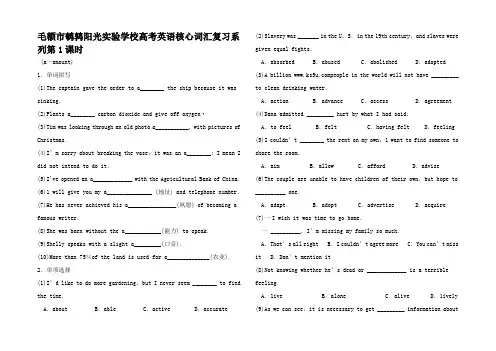
毛额市鹌鹑阳光实验学校高考英语核心词汇复习系列第1课时(a—amount)1.单词拼写(1)The captain gave the order to a________ the ship because it was sinking.(2)Plants a________ carbon dioxide and give off oxygen·(3)Tim was looking through an old photo a___________, with pictures of Christmas.(4)I’m sorry about breaking the vase;it was an a________; I mean I did not intend to do it.(5)I've opened an a_____________ with the Agricultural Bank of China.(6)1 will give you my a_______________ (地址) and telephone number.(7)He has never achieved his a________________(夙愿) of becoming a famous writer.(8)She was born without the a____________(能力) to speak.(9)Shelly speaks with a slight a_________(口音).(10)More than 75%of the land is used for a______________(农业).2.单项选择(1)I’d like to do mor e gardening,but I never seem ________ to find the time.A.about B.able C.active D.accurate (2)Slavery was _______ in the U.S.in the 19th century,and slaves were given equal fights.A.absorbed B.abused C.abolished D.adopted (3)A billion people in the world will not have _________ to clean drinking water.A.action B.advance C.access D.agreement (4)Dana admitted _________ hurt by what I had said.A.to feel B.felt C.having felt D.feeling (5)I couldn’t ________ the rent on my own;1 want to find someone to share the room.A.aim B.allow C.afford D.advise(6)The couple are unable to have children of their own,but hope to __________ one.A.adapt B.adopt C.advertise D.acquire(7)一I wish it was time to go home.一 __________.I’m missing my family so much.A.That’s all right B.I couldn’t agree more C.You can’t miss it D.Don’t mention it(8)Not knowing whether he’s dead or _____________ is a terrible feeling.A.1ive B.alone C.alive D.1ively (9)As we can see,it is necessary to get _________ information aboutthe company.A.a large number of B.the number of C.a large amount of D.the amount of(10)Max is hardworking, cheerful, and _________ honest.A. above allB. after allC. at allD. all in all3.词组填空take action / be aimed at / be addicted to / adapt to / be against / be accused of / agree withbe just about to / add up to / take advantage of(1)The children are finding it hard to____________ the new school.(2)The professor _____________stealing his student’s ideas.(3)The numbers ______________exactly 100.(4)Your story doesn’t ____________ what the police have told us.(5)I ________________ the good weather to paint the door.(6)The use of drugs _______________ the law;it’s illegal.(7)These measures __________________ preventing violent crimes.(8)We ___________________ leave when Jerry arrived.(9)The government must _______________ now to stop the rise in road accidents.(10)Some kids _______________ surfing the Net; they often forget their schoolwork.4.句子翻译(1)Tom没有参加这个会议。
高中英语3500词之700核心词汇拓展及专项训练(1)
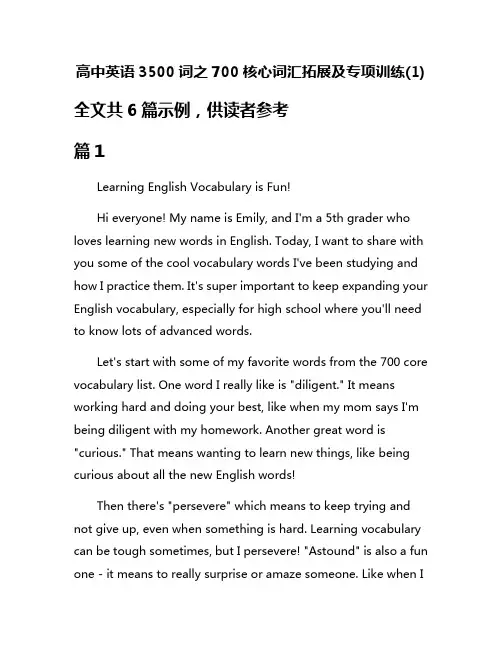
高中英语3500词之700核心词汇拓展及专项训练(1)全文共6篇示例,供读者参考篇1Learning English Vocabulary is Fun!Hi everyone! My name is Emily, and I'm a 5th grader who loves learning new words in English. Today, I want to share with you some of the cool vocabulary words I've been studying and how I practice them. It's super important to keep expanding your English vocabulary, especially for high school where you'll need to know lots of advanced words.Let's start with some of my favorite words from the 700 core vocabulary list. One word I really like is "diligent." It means working hard and doing your best, like when my mom says I'm being diligent with my homework. Another great word is "curious." That means wanting to learn new things, like being curious about all the new English words!Then there's "persevere" which means to keep trying and not give up, even when something is hard. Learning vocabulary can be tough sometimes, but I persevere! "Astound" is also a fun one - it means to really surprise or amaze someone. Like when Igot a perfect score on my vocabulary quiz, my teacher was astounded!Now let me share some ways I practice these new words to really learn them well. One thing I do is make flashcards with the word on one side and the definition on the other. I quiz myself or have my parents help me go through the stack. Seeing the words written out helps commit them to memory.I also try to use the new words when I speak and write as much as I can. Like I might say "Mom, I felt so diligent after cleaning my whole room today!" Using them in sentences reinforces what they mean. Sometimes my little brother laughs at me for using such big words, but that's okay!Another trick is to make associations between the new words and things I already know. For example, the word "intricate" means very detailed or complicated. So I picture a really intricate spider web or fractal pattern to remember it. Using my imagination helps the words stick in my brain.It's also helpful to look for the new vocabulary words when I'm reading books, watching movies, or listening to people talk. I get really excited anytime I come across one of my words being used in the real world. That reinforces my understanding of the actual meaning and usage.Sometimes I even make up silly rhymes, songs or stories using my vocabulary words to make them more memorable. Like: "The curious giraffe persevered, until the intricate web was cleared." Or I'll act out the meaning of a word to help ingrain it. It's all about making vocabulary practice as fun and multisensory as possible.Learning new English vocabulary words takes diligence and perseverance for sure. But if you're curious and use your imagination, it can be an astounding, enriching experience! Don't be intimidated by big, intricate words. The more you immerse yourself in them through different practice techniques, the more they'll stick in your awesome brain.Well, those are some of my favorite vocabulary words and strategies so far. What words are you working on? I'd love to hear your tips for making vocab practice engaging too. The key is to embrace the challenge, channel your inner diligence, and have fun with it. Before you know it, those 700 core words will be an intricate part of your astounding English skills!篇2Hi everyone! My name is Emma and I'm a 5th grader who loves learning new words. Today I want to talk to you aboutsome really important vocabulary for high school English classes. There are around 700 words that come up again and again, and if you learn these well, it will make everything so much easier!The first 25 words I want to cover are: analyze, approach, area, assess, assume, authority, available, aware, benefit, commit, commission, community, consequence, consistent, constitute, context, contract, contribute, convention, core, corporate, correspond, criteria, dedicate, and define.Let's start with analyze. This is a big word that means to study something closely and break it down into smaller parts so you can understand it better. When you analyze a book, you look at the plot, characters, themes, and writing style. Analyzing is really important for doing well on tests and essays.Approach is what you do when you deal with or handle a situation in a certain way. There are different approaches to solving a math problem or writing a paper. You have to pick the right approach for what you're trying to do.Area is a section of a place, subject, or activity. The area of a circle uses math, but you could also study the area of biology that looks at plants. There are many different areas you can focus on.To assess means to make a judgment about something, like when a teacher assesses your work by grading it. You might assess which snacks are healthiest to decide what to eat. It's important to assess options carefully.Assume means to accept something as true without proof. For example, you might assume a new kid likes sports without knowing for sure. Making too many assumptions can get you in trouble!If someone or something has authority, it means they have power and the right to give orders. Parents have authority over their kids, and police officers have authority to enforce laws. It's good to listen to legitimate authorities.When something is available, it means it can be gotten or used. Video games are only available to buy for a certain time before stopping production. Summer camp has limited available spots to sign up.To be aware means to know and be conscious of something.I try to be aware of my surroundings when I'm walking alone. We should all be aware of important issues happening around the world.A benefit is something good or helpful you get from a situation. Eating healthy foods is a benefit for your body. Going to a good school is a huge benefit for getting an education. Benefits make things worthwhile.If you commit to something, it means you're dedicated and willing to give your time and energy to it. I commit to practicing my violin every day. When you commit, you follow through instead of quitting.A commission is an official group of people appointed to find information or make decisions on an important issue. The President might create a commission to look into healthcare costs. Commissions provide guidance.A community is a group of people living together in the same area and sharing things. A neighborhood is one kind of community. It's important for communities to work together and support each other.A consequence is the result of an action or situation, either good or bad. If I don't do my homework, the consequence is getting a bad grade. Pollution has many negative consequences for the environment.When something is consistent, it means it stays the same without contradictions. A consistent routine or schedule is one you follow the same way each time. It's hard to be consistent with practice, but it pays off.To constitute means to be the parts that make up a whole thing. Fifty states constitute the United States of America. The courses I take constitute my school's curriculum.Context is the circumstances or facts that help explain a specific situation. Understanding the context of an argument or historical event is crucial to analyze it well. Context gives us crucial information.A contract is a binding agreement between two parties that needs to be followed. My parents and I signed a contract about household chores I need to do. Breaking a contract has consequences.To contribute means to play an active role by giving, providing, or doing something to help a larger cause. I contribute by volunteering and donating to charities. Everyone should try to contribute positively.A convention is a widely accepted traditional way of behaving or doing things. It's a convention to shake hands whengreeting someone new. Some conventions don't make much sense and could use an update!The core of something is its most important, central part that gives it its fundamental identity. Reading and writing skills are at the core of being an educated person. We all have core values too.A corporate culture or environment is one associated with a business company, especially a big one. Corporate life involves suits, ties, meetings, and making money. Many kids grow up wanting anything but corporate jobs!To correspond means to have a connection, parallel, or match up with something. The answers in my workbook need to correspond to the questions. Looking for correspondences helps find relationships and patterns.Criteria are the requirements or standards that are used to judge or make a decision about something. Colleges have criteria for who gets admitted based on grades, test scores, and more. Having clear criteria is important.If you dedicate something to someone, it means you commit it to that person, often to honor them. Authors dedicate books to loved ones. I want to dedicate my future success to my parents.And finally, to define means to state the precise meaning of something clearly. Dictionaries help us define words. You have to be able to define the terms you use in school essays.Phew, that was a lot of words! But doing this kind of vocabulary work now will make you a true word wizard when it's time for high school English. Let me know if you need any help along the way!篇3Hi friends! Today we're going to have some fun with English words. You know how important it is to learn new vocabulary, right? The more words you know, the better you can communicate and understand what you read and hear.Let's start with some of the most common words that you'll see over and over again in all kinds of materials. Words like "the," "a," "and," "to," and "is" are little helpers that connect the bigger, more important words together. They may seem small and simple, but they are super useful!Then we have words that describe things, like "big," "small," "red," "happy," and "hungry." These adjectives help paint a picture in your mind of what something looks like or howsomeone is feeling. For example, if I say "I saw a big dog," you can imagine the size of that pup!Don't forget the verbs - those action words like "run," "jump," "laugh," and "sleep." They explain what someone or something is doing. "My sister runs very fast" tells you about her skill and movement.There are also lots of different nouns you should know, which are the names of people, places, and things. "Teacher," "playground," "book," and "sandwich" are all examples. We couldn't talk about the world around us without all those specific noun words!Okay, I think that's enough of an intro. Now let's practice using some of these common vocabulary words in fun ways:First, let's play a quick game. I'll say a sentence with a word missing, and you have to fill in the blank. Ready?I really want to eat a _____ ice cream cone. (Yummy word needed!)The _____ barked loudly at the squirrel. (Animal noun word needed!)Jake _____ to the park to play on the swings. (Movement verb needed!)That is a _____ sweater with cool patterns on it. (Describing adjective needed!)Good job filling those in! See how just changing one word can completely change the meaning of a sentence? Vocabulary is powerful.Okay, next let's make some word associations. I'll give you a vocabulary word, and you think of another related word. Then we'll put them together in a sentence or phrase:Flower - bloom, garden, vase, petal, stemExample: The flower's bright petals were in full bloom in the spring garden.Dog - furry, bark, leash, bone, fetchYour turn!Sandwich - bread, lettuce, tomato, cheese, deliciousGreat! You're getting the idea.Finally, let's practice using some new vocabulary words in a little story time:One sunny morning, Jane woke up feeling very energetic (full of energy). "This is going to be an excellent day!" she said happily.Jane gobbled down (ate quickly) her breakfast and put on her comfortable shoes. She was eager (excited/ready) to go to the park.At the park, there were several elderly (old) people relaxing on the benches. Jane approached them politely and engaged (started talking to) an elderly man in conversation."What a gorgeous day!" the man exclaimed. Jane agreed it was delightful (pleasant/nice) weather.After chatting with her new friend, Jane spent time exploring the lush (green/thick) gardens and chasing butterflies. By lunchtime, she was famished (very hungry) from all her adventures...See how many descriptive vocabulary words we used there to make the story more interesting and vivid? Energetic, eager, elderly, gorgeous, delighted, lush, famished, and more! The more advanced words you learn, the better your English will become.That's all for our vocabulary fun today, but keep practicing every day. Read books, watch shows, listen carefully to howpeople speak and learn those new words. With hard work and repetition, you'll be mastering all 3500 vocabulary words in no time! An excellent job today, word nerds!篇4Learning Big Words for High School EnglishHi there! I'm an elementary school kid who loves learning new words. My big sister is in high school now, and she has to know a lot of really big vocabulary words for her English class. The teacher gave her a list of 700 core words that are super important. I want to help her practice those words so she can become an excellent English student!Some of the words seem kind of scary at first because they are so long. But you know what? Breaking them into smaller parts makes them much easier to understand. Let me show you how I've been helping my sister learn some of these tricky vocabulary titans!One of the words is "accommodate." It sounds funny, doesn't it? But when you break it apart, it's not so bad. "Accommo" means to make room for someone or something. And "date" reminds me of the dates on a calendar. So "accommodate" means to have enough space or room forpeople or things on certain dates. Like when my friends come over to play, my mom has to accommodate all of us in the living room.Another long word is "colleague." It has that weird "eague" part that looks hard. But "coll" sounds like the first part of "college." And I know colleagues are people you work with, kind of like classmates but for grown-ups with jobs instead of students. So colleagues are your co-workers, the other adults at your workplace or college.How about "deteriorate?" That's a mouthful! But "de" means move away or reduce. "Teri" makes me think of territories or areas of land. And "orate" reminds me of someone speaking or giving a speech. So "deteriorate" means for something to move away from its original good condition and get worse over time. Like how my poor treehouse deteriorates more and more each year until my dad has to rebuild it.This is fun! Okay, one more - let's try "exemplify." That "ex" is easy, it just means out or from. An example is something that shows what a bigger thing is like. And "fy" makes me think of simplify or do something in a basic way. So to exemplify means to show an example of something in a clear, simple way. Likehow my teacher exemplifies what good behavior looks like in class.Using word roots, prefixes, and suffixes really helps make sense of some of these crazy long vocabulary words. And thinking of examples from my own life makes it even easier to understand and remember them. My sister is so impressed that I can exemplify the meanings of words like accommodate, colleague, deteriorate, and exemplify!I'm going to keep working on the rest of those 700 core words to accommodate my sister's high school English skills. With a little practice, I can be a vocabulary titan too! Who's up for some more word root detective work? Let's make learning big English words fun!篇5Learning New Words is Fun!Hey there, kids! Are you ready to take your English vocabulary to the next level? Learning new words can be super exciting and open up a whole new world of communication and understanding. Today, we're going to focus on mastering 700 of the most important words from the High School English 3500 word list. Get ready for some serious word power!First things first, let's talk about why it's so important to learn new words. You see, words are like building blocks. The more words you know, the better you can express yourself and understand what others are saying. It's like having a secret code that unlocks doors to new adventures, stories, and ideas.Now, I know what you might be thinking, "But learning all those words sounds boring!" Well, fear not, my friends! We're going to make this journey into the world of words as fun and engaging as possible. Imagine yourself as a brave explorer, venturing into an uncharted territory of vocabulary. Every new word you learn is like discovering a hidden treasure!Before we dive in, let's talk about some strategies that will help you conquer these 700 words like a champ!Make It Memorable: Words are easier to remember when you associate them with something fun or silly. For example, if you're learning the word "abrupt," you could imagine an elephant suddenly stopping in its tracks and saying "ABRUPT!" in a funny voice. The sillier the connection, the better it will stick in your mind.Use It or Lose It: Once you've learned a new word, it's crucial to use it as often as possible. Pepper your conversations with your newfound vocabulary, and challenge yourself to use at leastone new word every day. It's like exercising a muscle – the more you use it, the stronger it gets!Play with Words: Who says learning has to be boring? Turn it into a game! You could create word puzzles, have vocabulary scavenger hunts, or even make up silly songs or raps incorporating your new words. The possibilities are endless when you let your creativity shine.Now, let's dive into some of those 700 words! Here are a few to get you started:Abrupt: Sudden and unexpected.Absorb: To take in or soak up.Abundant: Plentiful or more than enough.See? Those weren't so bad, were they? And just like that, you've already added three new words to your vocabulary arsenal!As we continue our word-learning adventure, remember to have fun, be creative, and don't be afraid to make mistakes. Every new word you learn is a step closer to becoming a vocabulary master. Who knows, you might even inspire your friends and family to join you on this exciting journey!So, what are you waiting for? Let's embark on thisword-tastic adventure together and unlock the incredible power of language!篇6Certainly! Here's an article on "3500 Words Extension and Specialized Training for High School English Core Vocabulary (1)" written in a tone suitable for elementary school students, approximately 2000 words long.Title: Let's Explore Amazing English Words!Hey there, fellow word explorers! Are you ready to embark on an exciting adventure into the world of English vocabulary? Brace yourselves because we're about to uncover some truly astonishing words that will make you sound like a literary genius!First things first, let's talk about the word "vocabulary." It simply means all the words you know and understand. Just like a brave explorer needs a trusty backpack filled with essential supplies, having a rich vocabulary is your most valuable tool for communicating effectively and expressing yourself clearly.Now, let's dive into our first batch of amazing words! Imagine standing in front of a vast ocean, and each word is like acolorful fish swimming gracefully in the depths. The more words you catch and add to your vocabulary, the more vibrant and diverse your collection becomes.Serendipity: This delightful word describes a happy and unexpected surprise or discovery. It's like finding a hidden treasure while exploring a mysterious jungle!Ephemeral: When something is ephemeral, it means it doesn't last for a long time. Imagine catching a glimpse of a beautiful butterfly fluttering by – its presence is fleeting, just like the ephemeral nature of certain moments.Quintessential: If something is quintessential, it means it perfectly represents the most typical or ideal example of something. For instance, a cozy cabin in the woods could be considered the quintessential camping experience.Conundrum: A conundrum is a puzzling question or problem that's difficult to solve. It's like encountering a maze deep within an ancient ruin, and you have to figure out which path leads to the hidden treasure!Plethora: This word describes an abundance or an excessive amount of something. Imagine stumbling upon a plethora ofexotic fruits growing wild in a lush rainforest – more than you could ever taste in one sitting!Phew, that was quite a lexical adventure! But don't worry; we're just getting started. As you continue to explore and expand your vocabulary, you'll discover even more captivating words that will transport you to different realms of understanding and self-expression.Remember, every word you learn is like adding a new piece to a magnificent puzzle, slowly revealing a bigger picture of the English language. So, keep your curiosity piqued, embrace new words with open arms, and never stop exploring the fascinating world of vocabulary!Who knows, maybe one day you'll become a legendary word explorer, sharing your knowledge and inspiring others to embark on their own lexical journeys. Until then, happy word hunting, my fearless friends!。
2021届高考英语3500词汇基础+提升练12含解析202102072209
2021届高考英语3500词汇(基础+提升)练12基础练(夯实基础)一、单词拼写(根据汉语或首字母提示写出单词的完全形式)1.These diagrams are especially helpful when we have a ___________(具体的)problem to solve at hand.【答案】concrete【句意】如果我们手边有解决的具体问题,你们这些数据就非常有用。
2.The shabby house ___________(倒塌)before the soldier could help the old woman out.【答案】collapsed【句意】士兵还没来得及把老妇人扶出来,破旧的房子就倒塌了。
3.e ___________(近). I want to tell you that she is ___________(密切)related to the case.【答案】close, closely【句意】走近点,我想告诉你她和这个案子有密切关系。
4.If we want to protect the environment, we must ___________(阐明)the problems and convince people to take action.【答案】clarify【句意】如果我们想保护环境,我们必须阐明问题并说服人们采取行动。
5.If you want to know something about the details, please ___________(点击)the website.【答案】click【句意】如果你想知道更多的细节,请点击。
6.Famous experts are often invited to some TV programs to ___________(评论)on international situations.【答案】ment【句意】一些电视节目经常邀请著名的专家来评论国际形势。
高考核心词汇700讲与练针对训练 Day 1
高考核心词汇700讲与练针对训练Day 1一、语法填空。
1. Though you have great (able), you are not able to do everything alone.2. (absorb) in her work, she didn’t notice the leader’s presence.3. You can not use the computer for free. (addition), you do not have access to the databases.6. Is this museum (access) to the disabled?9. Don’t worry. All the chairs and desks are(adjust). They are suitable for all pupils.10. She was lucky to be accepted a member of the club.二、单句改错。
1. What about move about in the garden for a while?2. Our teachers encourage us to think active and freely.3. The kids were talking loudly and playing wildly at the teacher’s absence.4. Reading enable you to learn about the world without going out.5. James got my invitation but he didn’t receive it, which upset me.6. The successful film is actual adapted from an unknown novel.7. The new forest park adds the attraction of the city.8. His disability was causing in an car accident last May.9. Try your best to adapt to live in the countryside. When you are in Rome, do as the Romans do.10. The disabled man abandoned the chance of going to abroad.三、根据汉语提示完成句子,每空一词。
高考核心词汇700讲与练针对训练 Day 11
高考核心词汇700讲与练针对训练Day11一、语法填空。
1.Columbus (discovery) America but did not explore the new continent.2.There is no distinctive (differ) between the twins.3.With the ___ __(develop) of economy, more and more students go abroad to study.4.Yesterday we had a heated __ __(discuss) about whether parents can read their child’s diary.5.Nobody is _____( doubt) that our team will win this match.6.To his (disappoint), his professor refused his application.7.The retired designer has a ______(desire) life in the quiet country.8.The accountant said she had some _ ____(difficult) in solving the problem.9.Now that you have heard the process of the event, you can draw a (conclude) whether to go or not.10.The date of a (distinguish) guest who will visit our school soon is drawing near.二、单句改错。
1.M y cousin who often dreams of travel in space doesn’t pass the driving test.2.The assistant is determined to making use of this summer vacation to learn Spanish.3.I am sorry to hear that you feel disappointing at your grades.4.The beauties have some difference ways to broaden their horizons and increase their knowledge.5.Our headmaster told us to separate the whole class into four small groups.6.All the senior students should limit their time on Wechat and devote themselves to learn science subjects..7.Most of the buildings was destroyed by Wenchuan Earthquake in 2008.8.The disappointed news drove the deliveryman coming from a remote country crazy.9.We have a well developing transportation system. It is very convenient.10.My niece doubted that whether she could overcome the problems.三、根据汉语提示完成句子,每空一词。
高中英语 教材核心词汇讲解及训练 新人教版选修7(2021年最新整理)
高中英语教材核心词汇讲解及训练新人教版选修7编辑整理:尊敬的读者朋友们:这里是精品文档编辑中心,本文档内容是由我和我的同事精心编辑整理后发布的,发布之前我们对文中内容进行仔细校对,但是难免会有疏漏的地方,但是任然希望(高中英语教材核心词汇讲解及训练新人教版选修7)的内容能够给您的工作和学习带来便利。
同时也真诚的希望收到您的建议和反馈,这将是我们进步的源泉,前进的动力。
本文可编辑可修改,如果觉得对您有帮助请收藏以便随时查阅,最后祝您生活愉快业绩进步,以下为高中英语教材核心词汇讲解及训练新人教版选修7的全部内容。
核心词汇梳理并重点训练选修 7Unit 1 Living well1. disability n. 伤残;无力;无能eg: She managers to lead a normal life in spite of her disabilities。
Our ability to think and speak separates us from other mammals.Chinese premier Wen Jiabao lit the cauldron (圣火盆) and announced the beginning of the relay, sparking a grand display of traditional Chinese dance by disabled artists。
2. adapt vt. 使适应;改编eg: The children are finding it hard to adapt to their new school。
The car’s fuel system was adapted to take unleaded gas。
I’m sure she’ll cope with the changes very well-she's very adaptable.3. annoy vt. 使…不悦;惹恼eg: It really annoys me when people forget to say thank you.I was really annoyed with him at that time.Everyone is annoyed by the amount of traffic in the city。
- 1、下载文档前请自行甄别文档内容的完整性,平台不提供额外的编辑、内容补充、找答案等附加服务。
- 2、"仅部分预览"的文档,不可在线预览部分如存在完整性等问题,可反馈申请退款(可完整预览的文档不适用该条件!)。
- 3、如文档侵犯您的权益,请联系客服反馈,我们会尽快为您处理(人工客服工作时间:9:00-18:30)。
高考英语核心词汇700讲与练Day 12 221.dress /dres/ n. 女服,连衣裙;(统指)服装;童装;v. (给…)穿衣【拓展】(1) dress up装扮;打扮;穿上盛装;装饰dress (sb.) up as ... (把某人)打扮/装扮成dress oneself/sb. 给自己/某人穿衣(2)be dressed in 穿着……衣服(表状态) get dressed 穿衣服【例句】①Children often dress up as Superman to draw adults' attention.孩子们经常把自己装扮成超人,以吸引大人的注意力。
②To my surprise,I found my nephew dressed in a girl’s skirt. 令我吃惊的是,我发现我的侄子穿着一条女孩的裙子。
【串记】The lady who is dressed in red dresses up her daughter in a new dress. 穿着红衣服的女士给女儿穿上了盛装。
222.drive /draɪv/ (drove,driven) v. & n.驾驶,开(车);驾车(旅行);驱赶/动【拓展】drive off/away驱离;开车离开drive sb. crazy/mad 让某人发疯【例句】I suggest (that) they (should) not drive too fast. 我建议他们不要开得太快了。
【串记】She drove away without saying a word, which drove me crazy. 她什么都没说就把车开走了,这使得我快发疯了。
223. drop /drɒp/ v. & n. 掉/落下;下降(同fall);放弃;滴【拓展】drop in顺便走访,偶然拜访drop in on sb. 偶然访问某人drop off减少;让…下车;睡着drop out (of) 退出/学【例句】He dropped off from his bike.他从自行车上跌下来。
【串记】I’d like to drop in on the student who dropped out of school several days ago. 我要走访一下前几天退学的那个学生。
224.dry /draɪ/ a.干的;干燥的;v. (使)变干;弄干【拓展】dry off (使)弄干,(使)变干dry up干涸;住口dry with 用…弄干drought n. 干旱;缺乏【例句】After these dry days, everyone hopes for rain. 干燥的天气之后,人人都希望下雨。
【串记】The plants are as dry as tinder(火绒) after this long drought.植物经过长期干旱之后干枯得如同火绒一般。
225.duty/'djuːtɪ/ 责任,义务;任务,职责;值班;税【拓展】do duty for代替……用,充当in duty bound在义务上(非……不可) off duty下班on duty值班,当班a sense of duty责任感do one’s duty尽本分【例句】①The sailors employed on this duty are well trained.担任这项任务的水手们都是受过良好训练的。
②It is our duty to obey the laws.遵守法律是我们的义务。
【串记】Everyone should perform his duty whether he is on duty or off duty. 每个人都要尽到职责,无论是上班还是下班期间。
226. eager/'iːgə/ a.渴望的,热切的【拓展】be eager to do...渴望做……be eager for sth. 急于得到……be eager for sb. to do...希望某人做……be eager that...热切地希望……[从句常用“(should)do”] eagerness n.渴望;热心eagerly a.渴望的;热切/心的【例句】①We are eager for him to help us. 我们渴望他帮助我们。
②They are too eager to show off their beautiful garden.他们急于炫耀他们漂亮的花园。
③Both stressed their eagerness to hear from readers and listeners on social networks. 双方都强调他们渴望听到社交网络上的读者和听众的声音。
【串记】【联想】表达“急切/盼望(做)……”的短语还有:be anxious for/to do...,long for,be greedy for,be hungry for,be dying for/to do...,be thirsty for,be keen on/to do...等。
227. earn /ɜːn/ vt.挣/赚得;赢得【拓展】earn/make a living by/from靠……谋生earn one's living谋生earn one's own living 自食其力earn money/a fortune 挣钱/大钱earn sb. praise/a reputation 为某人赢得赞扬/名声earnings n.收入【例句】①His hard work earned him good money.他工作努力,使他得到一笔可观的钱。
②Since his parents died early, he had to earn his own living when he was a teenager. 因双亲早亡,他十几岁的时候就不得不独自谋生。
③Saving a girl from the river earned him a good reputation.从河里营救了一个女孩为他赢得了好的名声。
228. ease/iːz/v.减轻,缓解;n.容易;安逸,舒适,自在【拓展】at one's ease舒适,快活地,自由自在feel at ease自在地,安心Stand at easel(口令)稍息! take one's ease休息,舒畅easy a.容易的;舒适的easily ad.容易地;无疑地229. educate/'edjʊkeɪt/ vt.教育;培养;训练【拓展】educate oneself自学educate one’s children to behave well教孩子守规矩educated a. 受过教育的;有教养的education n. 教育;培养;教育学educational a. 教育的;有教育意义的educator n. 教育家;教育工作者;教师【例句】①Teachers educate students to protect themselves.老师训练学生自我保护。
②In my eyes the question is not what to teach, but how to educate.在我看来,问题不是教什么书,而是如何育人。
【串记】The well-educated educator devoted himself to education. 这个教养很好的教育家献身于教育事业。
230.effect /ɪ'fekt/n.效果;作用;影响【拓展】(1)have an effect on/upon对……产生影响carry/bring/put ...into effect 实行,实施,使生效come into effect 开始生效;开始实施take effect 见效,生效,实施in effect 实际上;(规则、法律)有效/在实行中side effect 副作用(2)effective adj. 有效的effectively adv. 有效地【例句】①The new law has come into effect; surely it will have an effect on industry of the country.这项新的法律已经生效了;它肯定会对这个国家的工业有影响。
②Generally speaking, when taken according to the directions, the drug has no side effect.一般来说,按照说明书来服药是不会有副作用的。
③Training is much less effective than expected. 培训的效果远不如预期。
④Besides, developing a good habit of learning can help you improve your learning effectively. 此外,养成良好的学习习惯可以帮助你有效地提高你的学习水平。
【串记】The new traffic rules came into effect on January 1, 2015. Now, they are beginning to take effect.In effect , they have an effect on people's life in many ways besides people's focus on road safety. 新的交通规则于2015 年1 月1 日生效。
现在,它们开始生效。
实际上,除了人们关注道路安全之外,它们在许多方面对人们的生活产生了影响。
231. effort /'efət/ n.努/尽力;气/精力【拓展】(1)make an effort/efforts/every effort to do sth. (尽一切)努力做某事make efforts努力spare no effort to do sth. 不遗余力做某事(2)with effort 努力地without effort 不费力地,容易地【例句】①We must make every effort to turn our dreams into reality. 我们必须尽一切努力把我们的梦想变成现实。
